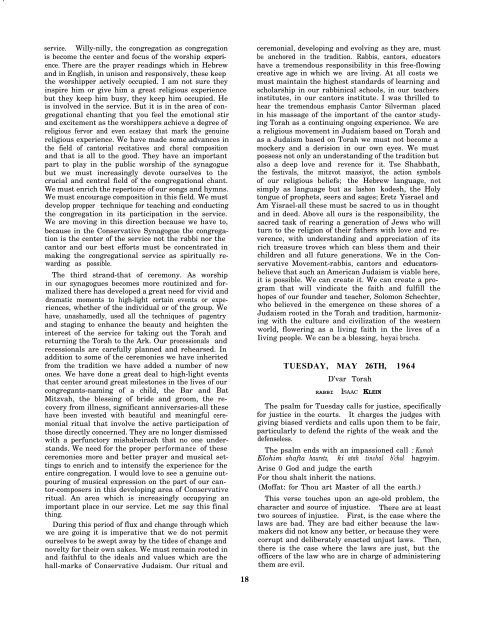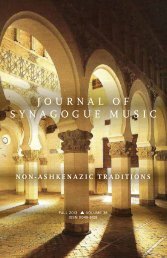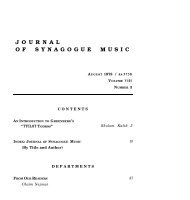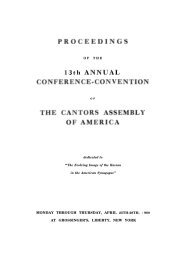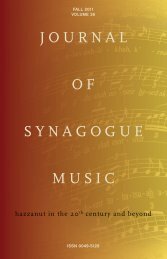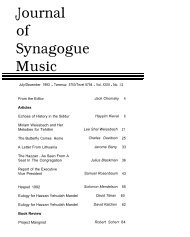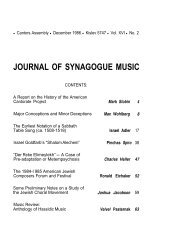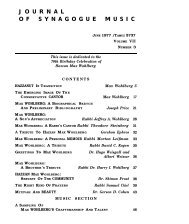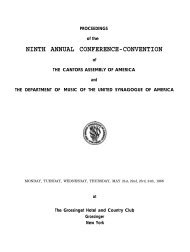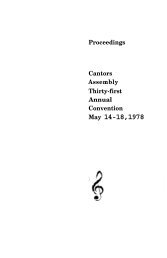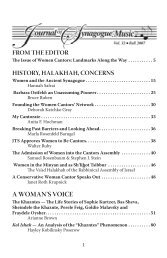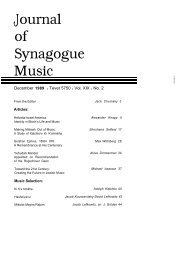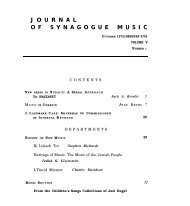1964 Proceedings - Cantors Assembly
1964 Proceedings - Cantors Assembly
1964 Proceedings - Cantors Assembly
Create successful ePaper yourself
Turn your PDF publications into a flip-book with our unique Google optimized e-Paper software.
service. Willy-nilly, the congregation as congregation<br />
is become the center and focus of the worship experience.<br />
There are the prayer readings which in Hebrew<br />
and in English, in unison and responsively, these keep<br />
the worshipper actively occupied. I am not sure they<br />
inspire him or give him a great religious experience<br />
but they keep him busy, they keep him occupied. He<br />
is involved in the service. But it is in the area of congregational<br />
chanting that you feel the emotional stir<br />
and excitement as the worshippers achieve a degree of<br />
religious fervor and even ecstasy that mark the genuine<br />
religious experience. We have made some advances in<br />
the field of cantorial recitatives and choral composition<br />
and that is all to the good. They have an important<br />
part to play in the public worship of the synagogue<br />
but we must increasingly devote ourselves to the<br />
crucial and central field of the congregational chant.<br />
We must enrich the repertoire of our songs and hymns.<br />
We must encourage composition in this field. We must<br />
develop propper technique for teaching and conducting<br />
the congregation in its participation in the service.<br />
We are moving in this direction because we have to,<br />
because in the Conservative Synagogue the congregation<br />
is the center of the service not the rabbi nor the<br />
cantor and our best efforts must be concentrated in<br />
making the congregational service as spiritually rewarding<br />
as possible.<br />
The third strand-that of ceremony. As worship<br />
in our synagogues becomes more routinized and formalized<br />
there has developed a great need for vivid and<br />
dramatic moments to high-light certain events or experiences,<br />
whether of the individual or of the group. We<br />
have, unashamedly, used all the techniques of pagentry<br />
and staging to enhance the beauty and heighten the<br />
interest of the service for taking out the Torah and<br />
returning the Torah to the Ark. Our processionals and<br />
recessionals are carefully planned and rehearsed. In<br />
addition to some of the ceremonies we have inherited<br />
from the tradition we have added a number of new<br />
ones. We have done a great deal to high-light events<br />
that center around great milestones in the lives of our<br />
congregants-naming of a child, the Bar and Bat<br />
Mitzvah, the blessing of bride and groom, the recovery<br />
from illness, significant anniversaries-all these<br />
have been invested with beautiful and meaningful ceremonial<br />
ritual that involve the active participation of<br />
those directly concerned. They are no longer dismissed<br />
with a perfunctory mishabeirach that no one understands.<br />
We need for the proper performance of these<br />
ceremonies more and better prayer and musical settings<br />
to enrich and to intensify the experience for the<br />
entire congregation. I would love to see a genuine outpouring<br />
of musical expression on the part of our cantor-composers<br />
in this developing area of Conservative<br />
ritual. An area which is increasingly occupying an<br />
important place in our service. Let me say this final<br />
thing.<br />
During this period of flux and change through which<br />
we are going it is imperative that we do not permit<br />
ourselves to be swept away by the tides of change and<br />
novelty for their own sakes. We must remain rooted in<br />
and faithful to the ideals and values which are the<br />
hall-marks of Conservative Judaism. Our ritual and<br />
18<br />
ceremonial, developing and evolving as they are, must<br />
be anchored in the tradition. Rabbis, cantors, educators<br />
have a tremendous responsibility in this free-flowing<br />
creative age in which we are living. At all costs we<br />
must maintain the highest standards of learning and<br />
scholarship in our rabbinical schools, in our teachers<br />
institutes, in our cantors institute. I was thrilled to<br />
hear the tremendous emphasis Cantor Silverman placed<br />
in his massage of the important of the cantor studying<br />
Torah as a continuing ongoing experience. We are<br />
a religious movement in Judaism based on Torah and<br />
as a Judaism based on Torah we must not become a<br />
mockery and a derision in our own eyes. We must<br />
possess not only an understanding of the tradition but<br />
also a deep love and revence for it. Tse Shabbath,<br />
the festivals, the mitzvot maasiyot, the action symbols<br />
of our religious beliefs; the Hebrew language, not<br />
simply as language but as lashon kodesh, the Holy<br />
tongue of prophets, seers and sages; Eretz Yisrael and<br />
Am Yisrael-all these must be sacred to us in thought<br />
and in deed. Above all ours is the responsibility, the<br />
sacred task of rearing a generation of Jews who will<br />
turn to the religion of their fathers with love and reverence,<br />
with understanding and appreciation of its<br />
rich treasure troves which can bless them and their<br />
children and all future generations. We in the Conservative<br />
Movement-rabbis, cantors and educatorsbelieve<br />
that such an American Judaism is viable here,<br />
it is possible. We can create it. We can create a program<br />
that will vindicate the faith and fulfill the<br />
hopes of our founder and teacher, Solomon Schechter,<br />
who believed in the emergence on these shores of a<br />
Judaism rooted in the Torah and tradition, harmonizing<br />
with the culture and civilization of the western<br />
world, flowering as a living faith in the lives of a<br />
Iiving people. We can be a blessing, heyai bracha.<br />
TUESDAY, MAY 26TH, <strong>1964</strong><br />
D’var Torah<br />
RABBI ISAAC KLEIN<br />
The psalm for Tuesday calls for justice, specifically<br />
for justice in the courts. It charges the judges with<br />
giving biased verdicts and calls upon them to be fair,<br />
particularly to defend the rights of the weak and the<br />
defenseless.<br />
The psalm ends with an impassioned call : Kumah<br />
Elohim shafta hauretz, ki atah tinchal b’chol hagoyim.<br />
Arise 0 God and judge the earth<br />
For thou shalt inherit the nations.<br />
(Moffat: for Thou art Master of all the earth.)<br />
This verse touches upon an age-old problem, the<br />
character and source of injustice. There are at least<br />
two sources of injustice. First, is the case where the<br />
laws are bad. They are bad either because the lawmakers<br />
did not know any better, or because they were<br />
corrupt and deliberately enacted unjust laws. Then,<br />
there is the case where the laws are just, but the<br />
officers of the law who are in charge of administering<br />
them are evil.


